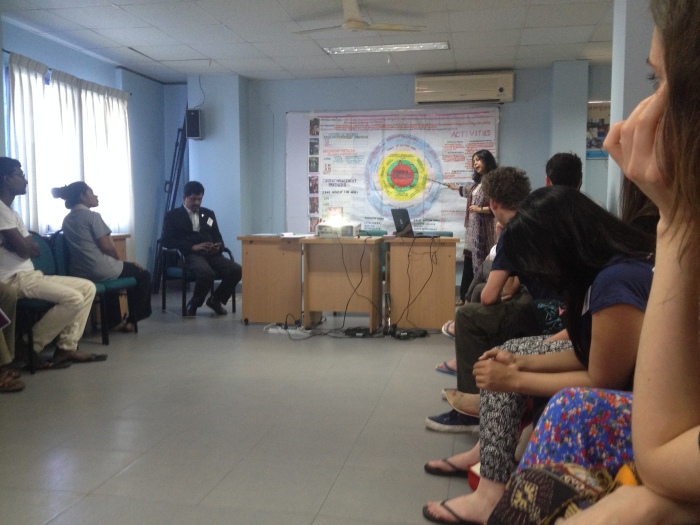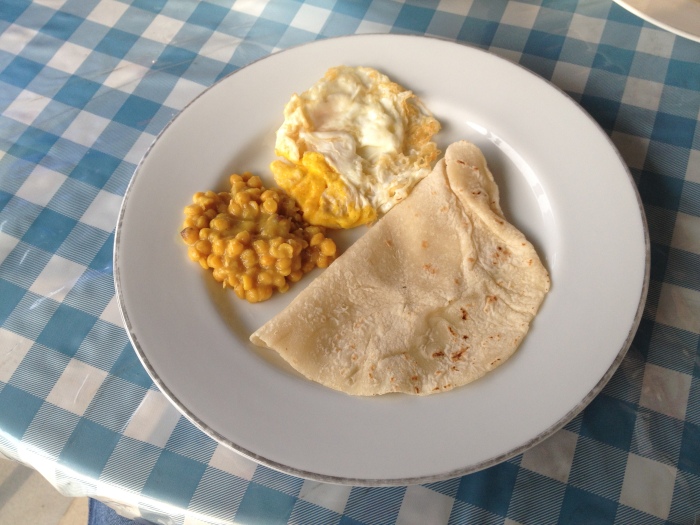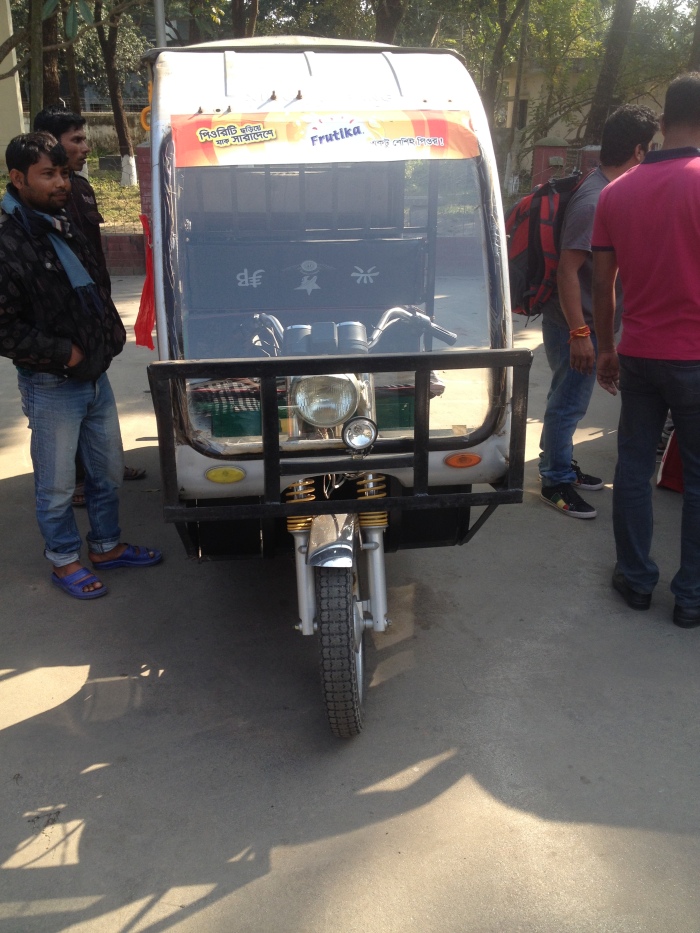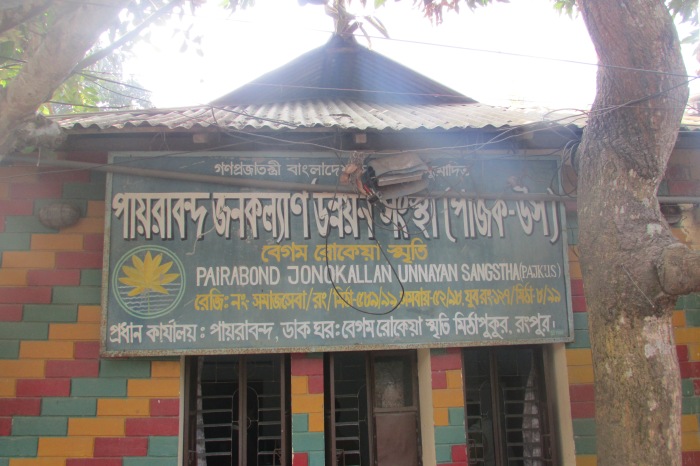Nine weeks have elapsed on the in-community phase of our VSO ICSE project and our time in community is nearing its end. I can safely say that life in Pairabond is simple and laid back. Me and my Bangladeshi counterparts live with a host family. Most houses in the village are made of thatched wood, tin or brick. My host family live in a brick house and on one side of the house we can see out to acres upon acres of rice paddies on the flat land. The villagers have had their potato harvest in the time I have been here and soon after the potato harvest, the empty land was transformed into rice paddies. Agricultural land is rarely seen left unused for more than a few days here as many livelihoods depend on the income generated from selling crops.
My host home is brilliant. We have all the basic facilities we require. Life is simple but comfortable and we have a lovely and caring host mother who cooks three meals a day for us. Some days we have fish, some days we have meat, but every day we have at least one form of potato dish. I have enjoyed the food my host mother cooks.
Mango and jackfruit trees are bountiful in our community but they have only recently finished blossoming. The fruit will not be available until June and I have been informed by my Bangladeshi Counterpart that the mangoes of the North West region of Bangladesh are the best in the world. I love mangoes so it is unfortunate that I will not be here in June when the mango season arrives.
When we first arrived in community nine weeks ago, it was the back end of the dry winter season. The day time temperatures were around 20 degrees Celsius whilst night time temperatures plummeted to around 5 degrees Celsius. Only cold showers are available here so you can only imagine what it was like taking a shower at night. We are now into the spring season and the day time temperature is increasing daily. The nights have also become milder which has made cold showers more bearable. Recently, we have experienced more frequent load shedding whereby we have no electricity for an unspecified period of time ranging from minutes to hours during the day and night.
Out of the four host homes currently occupied by VSO ICSE volunteers, mine is situated the furthest away from Pairabond bazaar and the NGO office. Bicycle rickshaws and easy bikes are the main form of transport around this community. We use these modes of transport to get to and from the NGO office where we work. We also use easy bikes for the one hour journey into Rangpur city. Rangpur is a small city compared to Dhaka but it still has many shops and bazaars. The roads of Rangpur city are full of easy bikes and bicycle rickshaws. These are relatively clean modes of transport which makes the city less polluted with fumes from vehicles as is the case in Dhaka. However, dust is a problem due to the dry weather.
After we finish office hours and during our free time, we sometimes play football in the high school playground opposite the NGO office. The locals play on a patchy field in the school with their bare feet and sticks used as goal markers. The locals are very friendly and are always happy when we join them to play. The style of play around here is unique to say the least. Short passing is not the style of play around here; it is normally either a clearance or a route one and hope for the best type of pass. I was not expecting to have the opportunity to play football matches in our community so it was a pleasant surprise when I found out that the people around here are football fans. However, the weather in the day time can reach 30 degrees Celsius which makes cricket an ideal sport to play. Cricket is very popular in the community and it has gained popularity amongst the UK volunteers. I never used to play cricket but since arriving in this community, I have played many times and I have quite enjoyed it.
The local children are very playful and curious. They run around the villages freely and there are a group of children who always play around my host home. Whenever we have the time, we play cricket, football and skipping with them. Sometimes they scream for us to come out and play when we arrive home after office or on our day off. I will miss these little rascals that wake me up on weekends. The children of this community know very little English. The phrases which they know and use constantly every time they see a UK volunteer are “how are you?” and “what is your name?”.
The team has been working hard during the past nine weeks to ensure that the aims of the project are met and I am delighted to say that we are on course to meet our objectives. We work 6 days a week on our ICSE project with a day off on Friday. So far we have completed numerous project tasks including entrepreneur reselection, market research, production worker basic training and selection, entrepreneur training, three community action days (CADs) and two active citizen days (ACDs).
One of the key targets of our project that we have accomplished is to provide training for at least 30 beneficiaries in the community. We have in fact exceeded this target and managed to provide formal training for more than 30 people. Firstly, we arranged basic handicraft training for 30 potential production worker candidates from the local community. We then selected 14 from the initial 30 candidates to be future production workers. Full training has been arranged for them and it is currently ongoing. Once the full training is complete, they will become employees of our two entrepreneurs. We also arranged numerous training for our entrepreneurs to increase their capacity and knowledge about running a business.
We have faced challenges but that is to be expected, especially with development work. I have embraced the challenges as part of my learning and the whole experience. One of the challenges we have faced is getting locals and youth club members to turn up on time to meetings and appointments. The culture in the village is relaxed and locals have a relaxed view on time management. People do not seem to be in any rush, just as you would imagine in a rural village community. As most of the volunteers on our team come from cities, it took some time to adjust to the local mannerisms and way of life. From our experiences, we have learnt that in order to get the locals to arrive anywhere near our proposed start time for a meeting, it is vital to inform them a start time which is at least thirty minutes before the actual start time.
Alongside our activities related to the start up of the two businesses, we have also worked on community integration. We have completed three CADs and two ACDs. It is important that the community feels that they are a part of our project and that we as volunteers are taking initiatives to help the local community too. One of our objectives is to build the capacity of locals and youth club members to make them more capable of developing and driving change in their own community. We have worked collaboratively with local Bangladeshi youth club members who represent poor and marginalised people in their communities. With input from local youth club members, VSO volunteers have strived to develop and implement initiatives that are locally relevant, sustainable and impactful.
Recently, on 26th March 2015, we did our third CAD and second ACD on the same day. The 26th March is Bangladesh Independence Day and it is celebrated nationwide. The CAD consisted of two phases. The first phase involved providing professional training to locals to increase their knowledge about livestock maintenance such as disease prevention methods. For the second phase of the CAD, local people of the whole village were invited to bring their cows to get a free vaccination to protect the cows from disease. For our ACD, we celebrated Bangladeshi Independence Day with the locals by hosting a cultural programme. We had an outdoor stage and an open audience which consisted of local school children, families and community people. The programme consisted children singing the Bangladesh national anthem and giving dance performances to music on stage. There were also poem readings and speeches. A games competition was also held for the children where they could win prizes. The most hilarious and my personal favourite competition was the lollipop race. Children had their hands behind their back and had to try and use their mouths to get lollipops dangling along a string which was being shaken by one person on each end of the string. The expressions on the children’s faces when they tried to get the lollipops, got tantalisingly close, and missed, is unforgettable.
My time here in Pairabond is coming to an end. I will miss this small rural Bangladeshi community, especially my host mother and the local children. There are some people that I have met in this community that will always be remembered. I know that there will be times when I think back and think of them. I have experienced many great moments and have abounding memories from the nine weeks I have spent volunteering to help the local people. It will be sad saying goodbye and making the final journey out of the community. I hope that one day in the future I will get the chance to come back here. It will be fascinating to see what has changed and if the two handicraft businesses that I have been a part of are prospering.
All that is left for us is a learning visit and a debrief before we head back to the UK.

































































































